| Reviews & Columns |
|
Reviews DVD TV on DVD Blu-ray 4K UHD International DVDs In Theaters Reviews by Studio Video Games Features Collector Series DVDs Easter Egg Database Interviews DVD Talk Radio Feature Articles Columns Anime Talk DVD Savant Horror DVDs The M.O.D. Squad Art House HD Talk Silent DVD
|
DVD Talk Forum |
|
|
| Resources |
|
DVD Price Search Customer Service #'s RCE Info Links |
|
Columns
|
|
|
Father Knows Best: Season Six
"There's only one, wonderful time to live...and that's today."
Maybe that's the best way to view Father Knows Best, too. Shout! Factory continues to prove it's the best releasing company out there when it comes to vintage television fare with the release of Father Knows Best: Season Six, a five-disc, 32-episode collection that gathers together the last original shows from the iconic series' final 1959-1960 season. Some disappointments for hard-core vintage TV fans, including no sight of the infamous 24 Hours in Tyrant Land episode (quick note: just received some emails saying this is on Season One), and a failure on the original producers' part to "wrap up" this important series with an appropriate coda episode. And sadly, not every episode is a home run here, as has been the case in the previous two seasons. However, this is still superior television: funny, charming, sometimes quite poignant, and always honest.
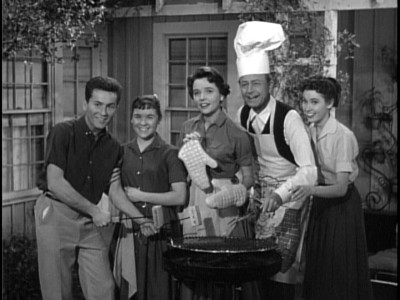
Springfield, in the Great American Midwest, circa 1959-1960. Jim Anderson (Robert Young), crackerjack agent for the Cavalier Casualty Insurance Company (wasn't it the General Insurance Company the previous season?), has an equally important job at home: helping his lovely, smart wife Margaret (Jane Wyatt) take care of their three growing children. Eldest Betty Anderson (Elinor Donahue) is now a senior in college, and when she's not obsessing about doing everything perfectly (including the proper etiquette for romancing in 1950s America), she's beginning to find her own voice and purpose outside her family role as father's "Princess." 18-year-old James, Jr.--"Bud" to everyone (Billy Gray)--is also beginning to evolve away from embodying the typical American teenaged boy, only interested in sports and his broken-down hot rod, towards a thoughtful, sensitive young man groping for the first time with big issues like personal responsibility and self-image, and of course, love, as he enters his freshman year in college. Youngest daughter Kathy ("Kitten") Anderson (Lauren Chapin), too, is fast-approaching the point where she'll leave behind the games and fantasies of young childhood for the more confusing, more rewarding - and more painful - realities of a young adult. The daily adventures of the Andersons might seem mundane, but within those small, daily occurrences, a surprisingly layered, deft view of the human condition shines through.
SPOILERS' WARNING!
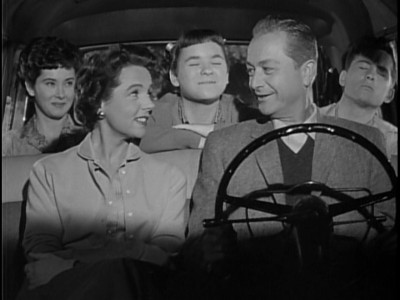
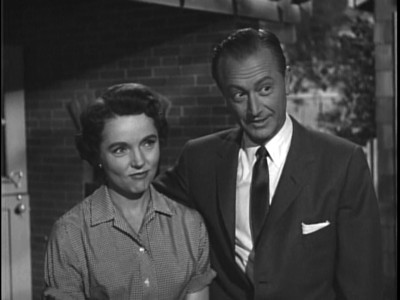
Last year, I wrote reviews for Season Four and Five of Father Knows Best, celebrating the series as a significant achievement in the popular culture of the 1950s, while defending its relevancy to today's viewer (you can read those reviews here, for context). I've had a surprising amount of feedback from those reviews (all of it quite nice), so I must have struck some kind of chord with other vintage TV lovers who also hold this series high in their memories. As I wrote in those previous reviews, Father Knows Best (and other sitcoms like it from that era of network television), frequently denigrated by today's academics who despise its so-called "traditional" views and perceived "backward" social and political attitudes, is actually quite honest and thoughtful (and most importantly, humorous, too) in the universal themes it explores, giving a warm, understanding vision of an admittedly idealized family that still engenders sympathy and identification with audiences today...if, sadly, they're even still aware of the show. During its original run, and then later in network re-runs and syndication, Father Knows Best reached saturation levels with American households over the decades, elevating the Anderson family into an iconic, ideal representation of the American family. However, I'm not sure where it is on the radar with audiences today. Is it only known to the over-40 crowd who grew up on constant re-runs of it? Do younger viewers remember it from its more recent syndication runs on Nick-at-Nite and TVLand in the 80s and 90s? Does it play anywhere today on a regular basis, or is it considered too ancient and square to ever take a prominent place in syndication again (the fact that this season is only available for direct mail-order should probably answer that question)?
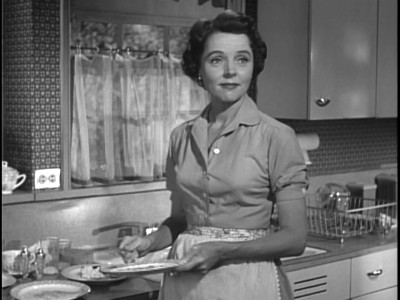
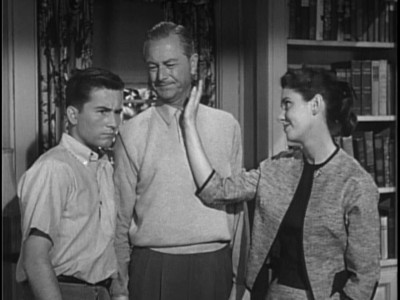
Considering how expert I feel the previous seasons were in conveying a beautifully modulated tone between gentle laughter and poignant family drama, I must admit that I probably had higher-than-realistic expectations for this final season. The general rule of thumb for sitcoms (perhaps a cliche, too, by this point), is that they generally start to run out of steam by their fifth season. Add to that the fact that Robert Young made it clear that he was growing bored with playing the same character for over ten years (if you add in the radio version), and one might fully expect Father Knows Best to start to peter out this sixth season. So as I watched this group of episodes, I kept finding myself wishing that each and every episode would somehow, retroactively, reflect my love for the series, and its importance in television's time-line of significant achievements. Of course, that's a ridiculous wish. No matter how seriously the regular group of writers for Father Knows Best took their work ―and I believe they did, considering how beautifully written these shows were ―I also imagine they viewed these 1959-1960 episodes as just another season for them to produce. The thought that a television series would live on, somehow, as an important cultural touchstone (rather than just as a syndicated moneymaker for a few years, perhaps), was a foreign concept for those involved with television production during this time. So of course, how could they possibly know fifty years ago that I and other vintage TV fans would want the end of Father Knows Best to somehow...sum up everything that was wonderful and special about the program?
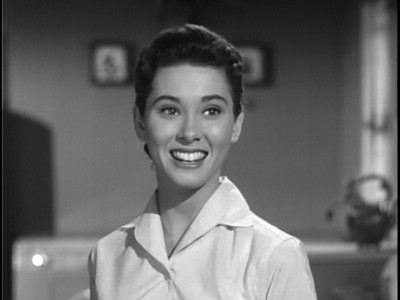
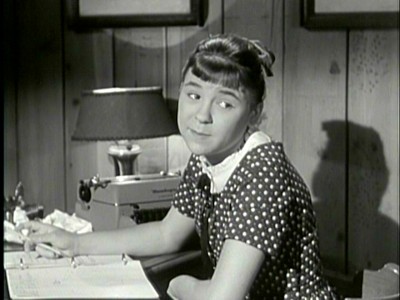
So that explains why I couldn't help but be disappointed that there was no "final" episode, where the Anderson clan metaphorical waves goodbye to the audience as their lives are suddenly "ended" for us. The last episode aired this season, on May 23rd, 1960, entitled Betty's Graduation, isn't really about Betty graduating from college at all ―it's a flashback "clip show," from Season Two, with new bracketing material relating Betty's fear of graduating high school with Kathy's fears of graduating middle school. We don't even get an original episode for the series' last show; it's a rerun. We get teased a few episodes before that when Betty appears to take a fiancé, Jim Hutton, in Betty's Career Problem, which would have provided some kind of wrap-up for her character. However, he disappears immediately, never to be mentioned again. We have no final images of Bud, coming to terms with negotiating his first year of college; we have no final image of Margaret and Jim, one of the most romantic, tender couples of 1950s television, looking out their window one final time, reminiscing about their lives together, and the moving on of their children. The series just...ends. To be fair, that what most television series did back then; it just wasn't thought necessary to wrap them up for the audience. I just wish this one had been different....
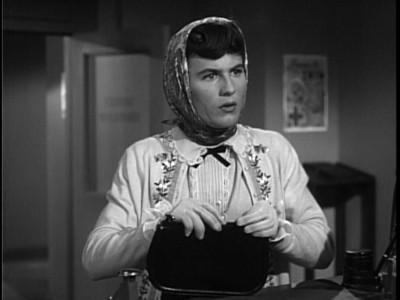
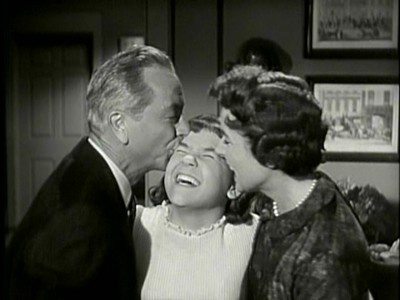
Still, there's much to admire here in this final go-around for the Andersons. While I can't say that episodes like Bud Branches Out (Bud falls for his pretty French teacher), The Imposter (Betty falls for Robert Reed), Bud Hides Behind a Skirt (Bud gets Betty in trouble over a traffic ticket), Cupid Knows Best (another "Fronck" episode), Bud the Speculator (Bud gets involved in a phony stock deal), or Not His Type (Betty dates her friend's boyfriend), are as of the same high caliber of previous seasons' offerings, they're still efficiently scripted and never less than amusing, particularly when the talented Elinor Donahue and Billy Gray (who get much more screen time this season, probably in an effort to grab the kids in the audience) are featured. Graduate students in media studies (yeeech), still mining American television's past for angry, strident papers about how awful things used to be in this country, will spin their heads over episodes like Kathy Becomes a Girl, where Jim explains that if Kathy wants to be liked by boys, she better start acting like a girl. Jim helpfully explains that boys don't want a competitor, and that Margaret has been using her "cute tricks"―which Jim fully expects and that both he and Margaret are fully aware of―of sometimes being...a little bit helpless, a little bit dependent at times, for twenty years. Feminists will of course flip their lids over stuff like this...while ignoring Jim's words that follow about women being self-sufficient and capable, and his self-aware irony of saying men like nothing more than playing this game, too, play-acting the "big, male protectors." And they won't like competent Betty choosing a man over a career in the appropriately-titled Betty's Career Problem...while ignoring the fact that the job is already hers to throw away, and that the decision is hers to make. Obviously, context is everything, and times have changed for the better, but Father Knows Best is never less than honest in portraying the age-old games the sexes play with each other, while managing, from time to time, to even be a little forward-thinking in its depiction of upcoming female roles (for what else is Betty other than the "new modern woman" emerging for the upcoming Kennedy era: brainy, accomplished, and driven in her career pursuits...even if she does get married at some future date).
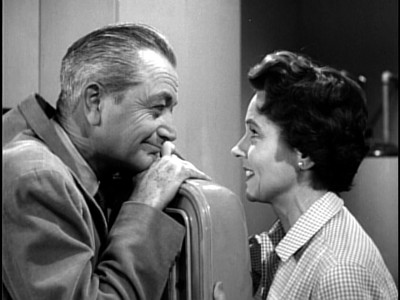
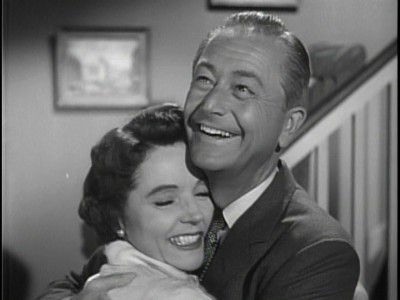
Critics and pop culture writers who keep regurgitating the same old cliches about 50s TV will grumble about episodes like Togetherness, where lead writer Roswell Rogers (under the sure hand of director Peter Tewksbury), shows a knowing amusement for the Sunday magazine view of 50s families sharing their "togetherness." Instead, Rogers highlights the reality of a family like the Andersons where everyone is out doing their own thing, and where even after Jim praises how their family sticks together...everyone walks out on him (a classic moment of thumb-nosing at that phony advertising, from the TV family that supposedly embodies that very phoniness). It's fascinating to me that a show that has come to represent the very values that so many new critics find distasteful, is in reality quite honest about those human emotions. In the clever The $500 Letter, a mysterious check for $500 arrives to one of the Andersons (the first name is deliberately left blank), and it's up to Jim and the rest of the family to wrack their brains and try to remember just what exactly they did for the former school janitor who has now made it big and who now wants to repay one of the family members' kindness. Of course, everyone wants the money, but Jim and Margaret become concerned at the kids' embellishments of their remembered small kindnesses to the man, until it's determined that it was Kathy, whose few brief words of encouragement ―and an offered stick of gum ―made an impression on the janitor that he never forgot. In today's TV world, the episode would end there, with the check cashed and Kathy spending it, but here, Kathy quite rightly feels she didn't do anything to deserve the money (Jim says small kindnesses towards people are to be expected, not paid for), so Jim tells her to put the money in the bank, and to try to live up to the way the janitor sees her ―a beautiful sentiment that feels resonates.
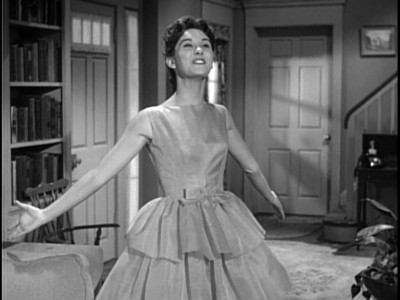
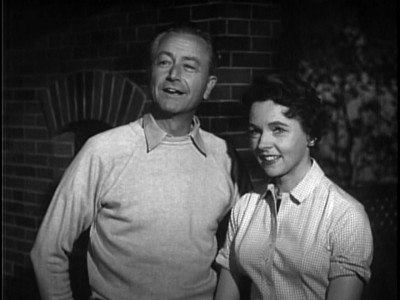
That's the beauty, though, of Father Knows Best: its ability to root all of its gentle humor in situations that genuinely uplift the viewer. In Jim's Surprise, Jim decision to wait on telling the family that he's won an award for Father of the Year backfires when the kids and Margaret are all disappointed that their dreams of materialistic pleasure aren't fulfilled (Margaret thought she was getting a maid, Bud thought they were getting a convertible, Kathy a swimming pool, Betty a trip to Hawaii). When the obviously hurt Jim reveals the secret, it's up to Margaret to get the kids to tell Jim what he's really accomplished: they're all scholastically "in line," and ready for their futures in college ―something Jim values far more than any fleeting pleasure that might come from a trip to Hawaii or a dip in the pool. In A Day in the Country, screenwriter Rogers establishes early on that Margaret doesn't appreciate Jim's not-so-subtle displeasure at having to attend her once-a-year family reunion (so much for the notion that 50s TV fathers were perfect, and the wives smiled through every slight). When the family breaks down on a deserted road in a borrowed station wagon, everything starts to go wrong, until Jim, who knows he disappointed Margaret, finally secures a ride for the family, while he waits for a tow. Just when we think Jim has "gotten away" with not going to the reunion (our cynical, modern TV view of where the plot is going), Margaret returns to wait with Jim ―it's not a family reunion without her husband. It's a sweet moment made funny again when a ride arrives for all of the Andersons.
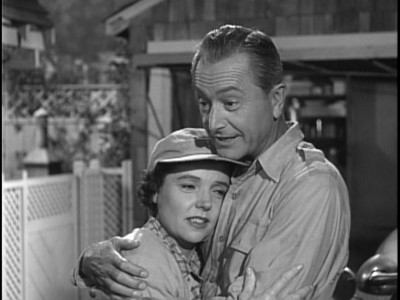
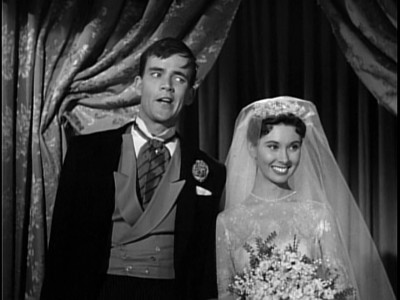
Equally sweet (and clever) is Margaret's Old Flame, where Margaret again is on the receiving end of Jim's obtuseness when it comes to Homecoming Week for Springfield College. Youthful Margaret dreams of going to the dance, but stick-in-the-mud Jim says they're too old...until Margaret starts receiving flowers from a mystery admirer, with several of her old beaus spotted in town for the festivities. Jim becomes increasingly annoyed, until he takes her to the dance, and even lets her wait on the balcony to meet her mysterious old flame...who turns out, of course, to be Jim ―which Margaret, of course, knew was Jim, all along. It's a seamless little comedy romance episode, filled with tinges of longing and sadness, and ultimately, a reaffirmation of a love that Jim and Margaret share that is sincere and...adult, for lack of a better word. Best of all the episodes here, Bicycle Trip for Two, written by Roswell Rogers, starts off with a seemingly mundane activity ―Jim and Margaret cleaning out the attic. As Jim starts going through the forgotten mementoes of his life, he philosophizes regretfully: "You know, speaking of memories, once in awhile, I get fleeting glimpses of moments from my boyhood. They strike almost like a pain, a pang in the pit of my stomach...I guess it's because you want to reach out and grab that moment. Relive it. Of course...you know you can't. Gone forever. Irretrievably lost." Young is simply terrific here (a most underrated actor), but importantly, the director, Peter Tewksbury, doesn't have Margaret react in kind; she's shown to be busy looking at other things...until she comes across a baby toy, and Jim's word stick with her. Staying in the spirit of his reveries, Jim proposes they recreate a happy moment from their early courtship: a bike ride to the lake for a picnic, but one disaster after another befalls this busy suburban father (the kids selfishly need his time; the bikes need repairing, the plumber arrives), until Jim is barking at Margaret, who knows Jim feels trapped in his life. It's a remarkably realistic, "true" moment in an already excellent episode, but instead of having Jim and Margaret go on that ride, Jim passes off the finally-fixed bikes to Bud and his girlfriend, along with Margaret's picnic lunch. As Jim truthfully admits, he was living in the past, and that's nowhere to live. Only today matters, and he brightly offers dinner and a movie to his lovely wife. Maybe that's the best way to view
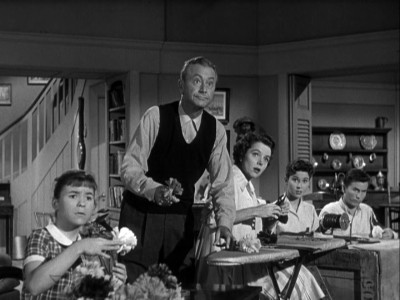
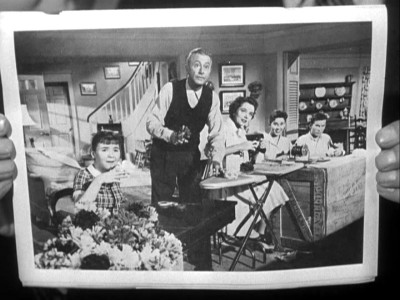
And certainly, the "here and now" of 1959-1960 embraced Father Knows Best as never before, shooting the series up to its highest Nielsen rating ever: sixth most-popular show for the year's end. Facing no competition from ABC's jazzy Bourbon Street Beat, and finally knocking dead its once high-riding NBC competition, Tales of Wells Fargo (which had been seventh the previous year but which dropped out of the Nielsen Top Thirty entirely this season), Father Knows Best achieved another note of distinction as a series voluntarily canceled at the absolute peak of its popularity (the next time that would happen would be The Andy Griffith Show). CBS, probably not exactly happy with star Robert Young for pulling the plug on this money earner, did something highly unusual: they reran episodes, in prime time, for another two seasons. And to top that: ABC then ran another season of reruns, in prime time, following CBS' reruns. Such was the popularity of this delightful comedy drama (ABC would also show reruns of the show on their network morning schedule for years, before decades of local syndication began).
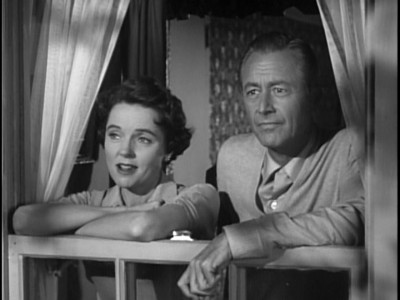
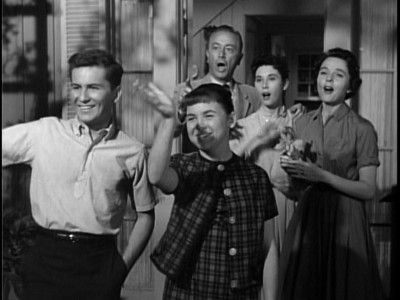
The DVD:
The Video:
As with the Season Four and Five sets I reviewed, there's no getting around the fact that the full-screen, 1.33:1 transfers used here for Father Knows Best: Season Six come from original materials (or video dupes, in some cases) that vary greatly in quality. Occasionally, you'll get a high-quality print that looks as good as anything a studio like Paramount will put out for its vintage TV releases. But mostly, they're of a lesser quality here, with grain and some video noise apparent, contrasty shifts now and then, and a mid-soft picture. It's not terrible (and stepping down to a smaller monitor helps), but this isn't top of the line (but they do look complete in run time, and that more than makes up for the quality).
The Audio:
The Dolby Digital English mono audio is a problem, though. Hiss is apparent and consistent, and recording levels are all over the place. Vintage TV lovers won't even notice, but newcomers might have some adjustments to make. English close-captions are not available.
The Extras:
Two more episodes of Robert Young's series, Window on Main Street are included. I've written before about this intriguing but ultimately failed series (a judgment that increasingly came into focus the more I saw different episodes). $1/19 Thief and Day in the Life of the Editor are included.
Final Thoughts:
The end of one of television's greatest sitcoms. A lovely, gentle series, with its humor firmly grounded in recognizable human truths, Father Knows Best didn't wind up the way I wanted it to (there's no "final" episode, and quite a few episodes, although good, aren't up to the exacting standards of previous seasons), but then again, who said it had to? It's still valuable viewing, though, with several touching, poignant episodes, and it's an absolute necessity for anyone interested in the best that television had to offer. I highly, highly recommend Father Knows Best: Season Six.
Paul Mavis is an internationally published film and television historian, a member of the Online Film Critics Society, and the author of The Espionage Filmography.


|
| Popular Reviews |
| Sponsored Links |
|
|
| Sponsored Links |
|
|
| Release List | Reviews | Shop | Newsletter | Forum | DVD Giveaways | Blu-Ray | Advertise |
|
Copyright 2024 DVDTalk.com All Rights Reserved. Legal Info, Privacy Policy, Terms of Use,
Manage Preferences,
Your Privacy Choices | |||||||












